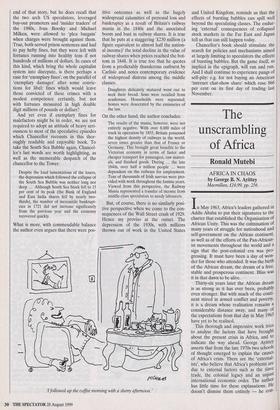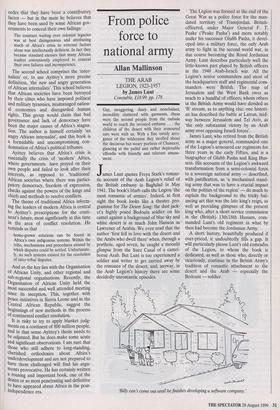The unscrambling of Africa
Ronald Mutebi
AFRICA IN CHAOS In May 1963, Africa's leaders gathered in Addis Ababa to put their signatures to the charter that established the Organisation of African Unity. This was the culmination of many years of struggle for nationhood and self-government on the African continent, as well as of the efforts of the Pan-African- ist movements throughout the world and a sign that the post-colonial era was pro- gressing. It must have been a day of won- der for those who attended. It was the birth of the African dream, the dream of a free, stable and prosperous continent. Bliss was it in that dawn to be alive.
Thirty-six years later the African dream is as strong as it has ever been, probably even stronger. But with much of the conti- nent mired in armed conflict and poverty, it is a dream whose realisation remains a considerable distance away, and many of the expectations from that day in May 1963 have yet to be realised.
This thorough and impressive work tries to analyse the factors that have brought about the present crisis in Africa, and to indicate the -way ahead. George Ayittey asserts that from the late 1970s two schools of thought emerged to explain the causes of Africa's crisis. There are the 'external- ists', who believe that Africa's problems are due to external factors such as the slave trade, the colonial legacy and an unjust international economic order. The author has little time for these explanations. lie doesn't dismiss them entirely — he con- cedes that they have been a contributory factor — but in the main he believes that they have been used by some African gov- ernments to conceal their own failings: The constant wailing over colonial legacies was at best disingenuous and attributing much of Africa's crisis to external factors alone was intellectually deficient. In fact they became standard excuses that many African leaders conveniently employed to conceal their own failures and incompetence.
The second school comprises the 'inter- nalists' or, to use Ayittey's more precise definition, 'the new and angry generation of African internalists'. This school believes that African societies have been betrayed by their elites who have imposed political and military tyrannies, mismanaged nation- al economies and disregarded human rights. This group would claim that bad governance and lack of democracy have been the major causes of Africa's stagna- tion. The author is himself certainly 'an angry African internalist', and this book is a formidable and uncompromising con- demnation of Africa's political tribunes. Ayittey believes that Africa's crisis is essentially the crisis of 'modern' Africa, where governments have preyed on their own people and failed to look after their interests, as opposed to 'traditional' African societies where there was partici- patory democracy, freedom of expression, checks against the powers of the kings and chiefs and methods to resolve conflicts.
The theme of traditional Africa inform- ing the leaders of modem Africa is central to Ayittey's prescriptions for the conti- nent's future, most significantly at this time in the area of conflict resolution. He reminds us that
home-grown solutions can be found in Africa's own indigenous systems. Within the tribe, mechanisms and procedures existed by which disputes could be settled. Unfortunate- ly, no such systems existed for the resolution of inter-tribal disputes.
And so the key lies with the Organisation of African Unity, and other regional and sub-regional organisations. Recently, the Organisation of African Unity held the most successful and well attended meeting since its inception. This, together with Peace initiatives in Sierra Leone and in the Central African Republic, suggest the beginnings of new methods in the process of continental conflict resolution.
It is risky to try to apply blanket judg- ments on a continent of 800 million people, and in that sense Ayittey's thesis needs to be adjusted. But he does make some acute and significant observations. I am sure that those who still adhere to long-standing, cherished orthodoxies about Africa's underdevelopment and are not prepared to have them challenged will find his argu- ments provocative. He has certainly written arousing - and important book, one of the dozen or so most penetrating and definitive to have appeared about Africa in the post- independence era.



























































 Previous page
Previous page